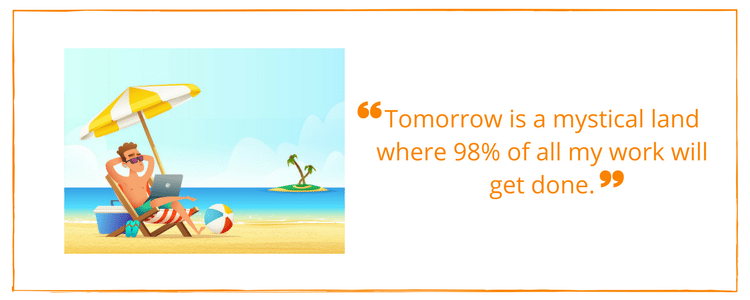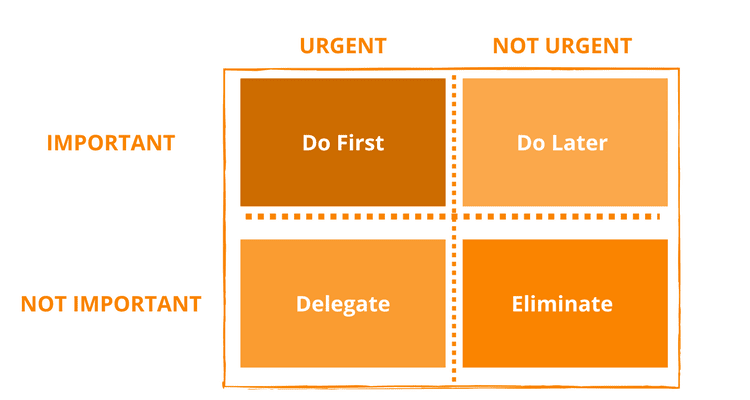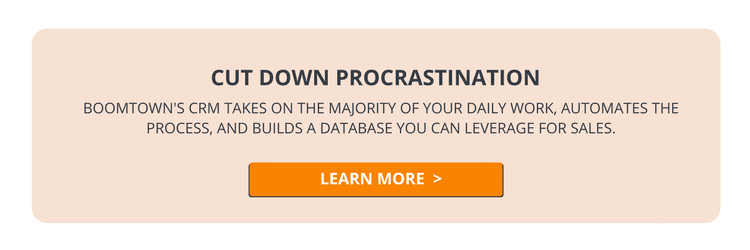Is Procrastination Sabotaging Your Real Estate Business?

Procrastination. We readily admit doing it, but hardly any of us tries to break the habit. How many times have you said, “I’ll get to this later”? Well … today you’re going to get to it. And I’m going to show you how.
If you need some motivation on why, check this out: Procrastinators typically make 26% less income than their productive counterparts.
Does earning less make you feel good? Think about it. Procrastination is an emotional issue, not a time management issue. Buying a planner or downloading an app isn’t going to help. We procrastinate because we want to feel good. Who wants to do the dishes after you’ve enjoyed a delicious meal and your tv show is about to come on?
You’d much prefer the “better, more fun” option, despite the negative consequences later. And this is why procrastination is such a LARGE issue. More and more — especially in real estate — we’re left to our own devices. We’re expected to work independently, to self-manage. We don’t have mommy’s voice in the back of our heads anymore, saying do this or do that.
You have to manage yourself. But let’s be honest, we are our own worst cheaters. We want to feel good. We don’t want to feel like we’re working.
So, let’s go over some strategies to overcoming procrastination.

1Procrastination is NOT a Time Management Issue
Procrastination comprises over one quarter of most people’s working days. For employers, this averages to a cost of $10,000 per employee, per year. In real estate, an agent’s income is based on their own productivity — meaning procrastination is costing you $$$.
Now, here’s the kicker. Procrastination is not a time management issue. It’s a task management issue. Remember trying to cram your college paper the night before it was due? It’s not that you managed your time wrong. You simple chose the wrong tasks to do leading up to this point.
Essentially, you were doing a task — just not the one you should have been doing.
The real problem is willpower. Like I mentioned before, we give in to feeling good. It’s like Luke Skywalker being tempted by the dark side of the Force. We experience a weakness in will.
Solving procrastination starts with one question. Answer: “Why is it important for me to finish this?”
By asking yourself this question, you begin looking to the future. Will this hurt me tomorrow? Will I enjoy doing the dishes tomorrow, when there’s more dishes? Probably not. Then it becomes easy for you to convince yourself: Just do the work now.
One tool to help you choose the right task is the Eisenhower Matrix. As you know Dwight D. Eisenhower was Allied Powers Supreme Commander. He had to make tough decisions continuously about which of the many tasks he should focus on each day. This led him to the following solution:

Now, what happens when you run out willpower? It’s like a muscle. Eventually it gets worn down, but it’s not completely gone. The trick is value affirmations. Reflect on why it’s important and what you’ll achieve by it. You can even say it out loud, like a lot of Sales Team do for each other. Example: “No, I will not eat this doughnut. I want to lose weight and look good for beach season.” It can give you a small boost in times of need.
2Working Under Pressure is Nonsense
A lot of us believe we work better under pressure. It’s complete nonsense. Studies have regularly shown we make errors in work while under pressure. Some of us require a fire to be lit from underneath us to get work done. Really, it’s just an issue of procrastination.
One method for overcoming this is the “Abstract vs Concrete” formula.
When you think about things concretely, they belong to today. When you think about things abstractly, they belong to tomorrow. Your mind pushes the work until later because it seems large and fearful. You don’t quite understand what to do yet (or what to do first).
Break the task down. Break it into small steps, small goals. That way, you can define a concrete step to take today, versus trying to figure out how to solve the whole puzzle in one swoop. When your brain thinks about something concretely, it thinks it’s urgent and will get it done.
Example:
- Abstract: “Our conversion rate is bad. We need to follow-up with leads better.”
- Concrete: “Our conversion rate is dropping. Let’s follow up with new leads within five minutes using an email and a text.”
3How to Stop Procrastinating – A Few Steps to Learn
Here are three different tactics depending on the situation.
#1. Tackling fear and “internal negative talk.” Sometimes we procrastinate because we want to avoid the “bad” feelings. We think, “If I avoid this task, I can get away from any negative feelings that I might receive.” Example: Creative artists who submit their work can get scared because they’re afraid people will think their work is terrible. So they avoid doing artwork. It’s called negative reinforcement. People who want to be perceived as perfect in society often suffer from this.
#2. Overcoming task aversiveness. At times we avoid work because it’s boring, frustrating, or we resent it. You can break a task into 3 stages: INCEPTION > PLANNING > ACTION. If there’s a lack of meaning, you’ll often avoid the task in the inception and planning stages. If there’s a lack of structure, people usually fail to complete the job in the action stage. To solve these, make sure you provide meaning and structure to the work.
#3. Today vs Tomorrow. All you have to do is think about it in the future tense. Will the problem only get worse if you delay it? Should I get this done now, so I don’t hurt anyone else later on? Keep your brain focused on the why, and you’ll see yourself reducing procrastination.
4The Ultimate Ultimate Weapon – Achieving Identity
The “unknown” can be one of the biggest obstacles to eliminating procrastination. It’s hard to motivate yourself when you don’t know what you want — or who you want to be. This is why you need to achieve an identity. Who do you want to be? When you know who you are, there will be less procrastination because you’ll have a goal.
If you don’t know why you’re in real estate, it’s going to be hard to complete your tasks. You’re not going to like it when your broker tells you to call all these leads, and so on. But if you know you’re in real estate for a flexible work schedule and for the potential to earn more money, you’ll understand why you need to call leads. You’ll connect the actions with the goals. That reduces procrastination.
The post Is Procrastination Sabotaging Your Real Estate Business? appeared first on BoomTown!.
